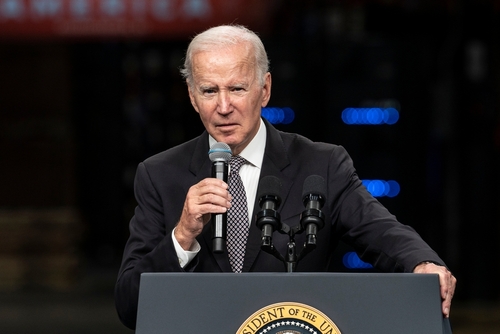In a move to encourage choice in retirement saving, President Biden vetoed a measure on Monday that the administration says would block plan fiduciaries from freely considering the best interest of workers and savers in retirement plan investment offerings.
The veto, the first of the Biden Administration, comes in response to a joint resolution (H.J. Res. 30) passed under the Congressional Review Act by slim majorities in the House and Senate at the end of February. The resolution sought to prevent Prudence and Loyalty in Selecting Plan Investments and Exercising Shareholder Rights, informally known as “the ESG rule,” from taking effect. 
“I just signed this veto because legislation passed by the Congress would put at risk the retirement savings of individuals across the country," Biden said in a video posted to Twitter. "They couldn’t take into consideration investments that wouldn’t be impacted by climate, impacted by overpaying executives, and that’s why I decided to veto it – it makes sense to veto it.”
The Department of Labor regulation took effect on Jan. 30, 2023, countering what many saw as a disincentive by the last administration to consider environmental, social, and governance investing strategies in retirement plans. In contrast, the new regulation permits, but does not require, plan fiduciaries to consider the potential financial impact of ESG factors alongside other financial considerations when they select retirement investments and exercise shareholder rights, such as proxy voting.
“It’s really unfortunate that it has to come to this,” said Brian Graff, CEO of the American Retirement Association, which supports the veto. “The DOL final rule was entirely neutral and absolutely reinforced the principle that the financial interests of participants must always come first. The single reference to ESG in the rule was entirely permissive and frankly has no legal consequence. Despite those realities, the politics around the ESG brand led Congress to take action, and we agree that the appropriate response is a presidential veto.”
SEE EXCLUSIVE ESG RULE COMMENTS FROM THE DOL’S TIM HAUSER HERE
The Biden Administration had previously announced that the president would veto H.J. Res. 30 if presented to him.
“To be clear, the 2022 rule is not a mandate—it does not require any fiduciary to make investment decisions based solely on ESG factors,” the White House said in a statement. “The rule simply makes sure that retirement plan fiduciaries must engage in a risk and return analysis of their investment decisions and recognizes that these factors can be relevant to that analysis.”
It further contended that the rule issued in 2020 under the Trump administration had a “chilling effect” on retirement investment advisers otherwise inclined to consider ESG factors when making investment decisions, even if the advisor determined that these factors were material to investment decisions.
HEAR AN EXCLUSIVE INTERVIEW WITH ASSISTANT LABOR SECRETARY LISA GOMEZ HERE
“That rule stepped between workers and the investment advisors that they have trusted to protect their hard-earning life savings,” the Biden statement emphasized. “The 2020 rule effectively stopped plan managers from considering all factors relevant to investment decisions that should be designed to protect the hard-earned savings they were charged to manage.”
The resolution was initially introduced by Rep. Andy Barr (R-KY) in the House and Sen. Mike Braun (R-IN) in the Senate. It was approved in the House on a near party-line vote of 216-204. Democrats Joe Manchin (WV) and Jon Tester (MT) joined all Republican senators in supporting the resolution resulting in a vote of 50-46 (with one Republican and three Democrats absent from the vote).
The two-page resolution simply states, “That Congress disapproves the rule submitted by the Department of Labor relating to ‘Prudence and Loyalty in Selecting Plan Investments and Exercising Shareholder Rights’ (87 Fed. Reg. 73822 (December 1, 2022)), and such rule shall have no force or effect.”

